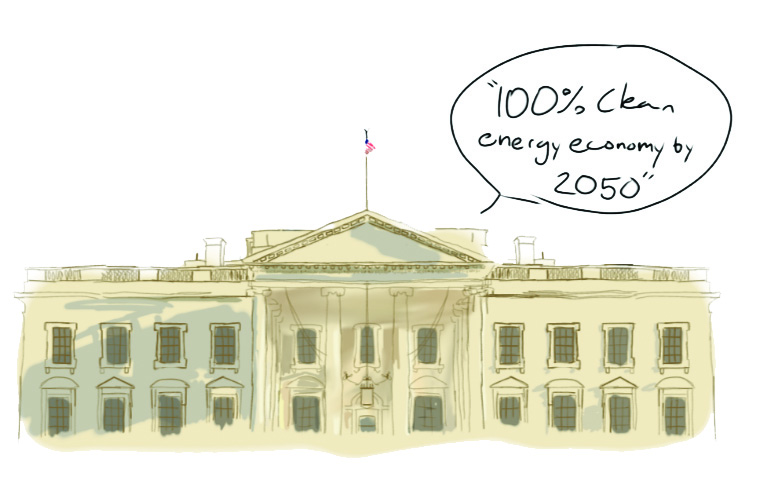The Trump administration presented a preliminary 2018 budget covering discretionary federal spending on Thursday, March 16.
Discretionary spending covers nearly a third of federal spending and includes non-mandatory spending which pays for defense and other federal agencies. Mandatory spending primarily covers the costs of Medicare, Medicaid, Social Security and the interest on the federal deficit.
Funding was cut from nearly every federal department and agency to pay for increases in defense and national security spending, a down payment for the wall on the Mexican border and school voucher programs. The proposed budget completely eliminates all funding for 19 federal agencies. Organizations that are completely defunded by the budget include agencies that support the arts, humanities, sciences, education and economic development.
The agencies which will be completely defunded by the new budget are the National Endowment for the Arts, the National Endowment for the Humanities, the Institute of Museum and Library Services, the Legal Services Corporation, the Corporation for National and Community Service, the U.S. Institute of Peace, the U.S. Interagency Council on Homelessness, the Woodrow Wilson International Center for Scholars, the African Development Foundation, the Appalachian Regional Commission, the Chemical Safety and Hazard Investigation Board, the Delta Regional Authority, the Denali Commission, the Inter-American Foundation, the U.S. Trade and Development Agency, the Neighborhood Reinvestment Corporation, the Northern Border Regional Commission, the Overseas Private Investment Corporation and the Corporation for Public Broadcasting.
All federal departments except the Department of Defense, the Department of Veteran’s Affairs and the Department of Homeland Security received a drop in funding. The three departments will see increases to their budgets; combined, they currently make up approximately 20 percent of the current federal budget.
Federal departments and agencies that experienced significant budget cuts but were not eliminated in the budget include the Department of Agriculture, the Department of State, the Department of Health and Human Services, the Department of the Interior, the Department of Housing and Urban Development, the Department of Energy, the Department of Education, the Department of Commerce, the Department of Justice, the Department of Labor, the Department of Transportation, the Department of the Treasury, the Environmental Protection Agency, NASA and the Small Business Administration.
Many states that voted for Trump during the 2016 election would see major cuts in federal funding for their economic development. The Appalachian Regional Commission, the Delta Regional Authority and the Denali Commission are completely defunded by the budget. Due to those cuts, the states of Alaska, La., Ark., Ala., Miss., Mo., Tenn., Ky., Pa., Ohio, S.C., N.C., Ga. and W. Va. would see a nearly 180 million dollar cut to federal spending devoted to improving the quality of life for the residents of these states.
Funding for the fight against climate change and environmental protection is also heavily cut by the proposed budget. The budget for the Environmental Protection Agency is cut by 2.5 billion dollars, which completely eliminates funding for international climate change prevention programs.
In addition, NASA’s Earth science budget has been cut by 102 million dollars, terminating programs aimed at understanding climate change.
A Department of Commerce program which prepares coastal communities for rising sea levels and worsening storms due to climate change has been eliminated. Climate change prevention programs have been completely eliminated from the Department of State, including funding United Nations efforts to combat climate change.
Finally, 900 million dollars has been cut from the Department of Energy’s Office of Science, which funds climate change research and supports science education, among other research projects related to energy and physical sciences.
Education funding takes a large hit in the preliminary budget. 3.7 billion dollars has been cut from federal grants for teacher training, after-school and summer educational programs, and aid programs that benefit students who are either from low-income families or are first-generation immigrants.
However, as a reflection of the priorities of Education Secretary Betsy DeVos, charter school funding is increased by 168 million dollars and new school voucher programs will be created that will cost 1.25 billion dollars.
Aid for low-income areas is also severely cut. The budget eliminates grants for Community Development Financial Institutions, which provide aid to economically distressed neighborhoods. In addition, over 3 billion dollars in community development grants are eliminated.
Federal art and cultural agencies take the most dramatic cuts in the budget, with the National Endowment for the Arts, National Endowment for the Humanities, Corporation for Public Broadcasting, the Institute of Museum and Library Services and the Woodrow Wilson International Center for Scholars, being completely defunded. Many international cultural-exchange programs paid for by the State Department are also eliminated.
These programs support public television channels and radio stations, such as PBS and NPR, provide scholarships and fellowships in the social sciences and humanities, provide money to support over 123,000 libraries and 25,000 museums, support art and humanities educational programs and provide grants to local art and humanities projects and institutions. The combined costs of these agencies currently make up less than 0.1 percent of federal spending.
Local news stations will be most affected by this cut, as many local stations receive government funding through NPR and PBS. Many of those local stations in places such as Alaska are one of the only sources of news for their area in the native language of the residents. Cuts to PBS and NPR may force these local stations to abandon their programming, even though they may be the only source of news for a particular area.
Humanities teacher Christopher Ellinger expressed deep concern over the cuts to the federal cultural programs.
“PBS and the shows it provides like Sesame Street and art programs are foundational things and these cuts to them are very alarming,” Ellinger said.
Concerned that a lack of funding for certain federal programs could limit the ability of kids to find a passion in the field of the arts and humanities, Ellinger said, “These endowments and programs allow kids to see the opportunities and have experiences in the art and humanities fields and when you remove that it makes it more difficult for kids to see what’s out there.”
There have been attempts to cut the National Endowment for the Arts and National Endowment for the Humanities in the past, but these efforts have never succeeded. Both the Ronald Reagan Administration and Newt Gingrich during his time as Speaker of the House attempted to eliminate both of the endowments, but both attempts failed to gather enough support and were ultimately abandoned.
Ellinger thinks that once the final 2018 budget is released, the budget cuts for many programs will be less severe. However, he asserts that many budget cuts cannot be avoided.
“I believe that in the final budget the cuts will not be as drastic as they are now, but there will definitely be some cuts to these programs in the end. I just hope that the final cuts will not be as severe as they are now,” Ellinger said.
The budget must pass through the House and Senate Budget Committees as well as through a vote of both chambers. Advocates for many of the federal programs which face defunding hope that the House and Senate will eliminate many of the budget cuts.















